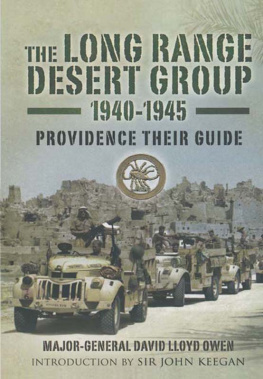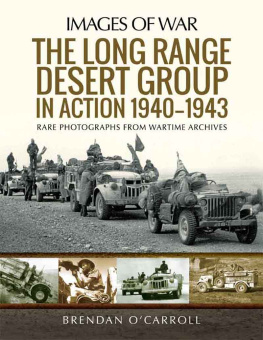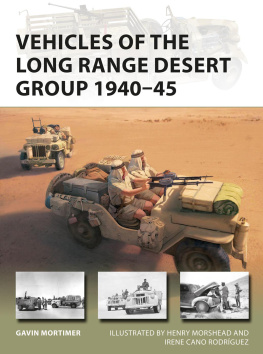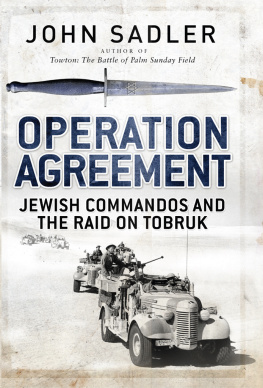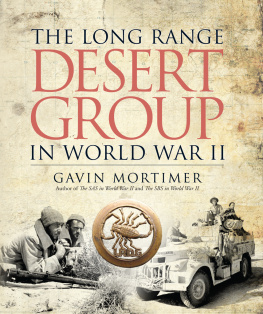David Lloyd Owen - Long Range Desert Group 1940-1945: Providence Their Guide
Here you can read online David Lloyd Owen - Long Range Desert Group 1940-1945: Providence Their Guide full text of the book (entire story) in english for free. Download pdf and epub, get meaning, cover and reviews about this ebook. year: 2009, publisher: Pen and Sword, genre: History. Description of the work, (preface) as well as reviews are available. Best literature library LitArk.com created for fans of good reading and offers a wide selection of genres:
Romance novel
Science fiction
Adventure
Detective
Science
History
Home and family
Prose
Art
Politics
Computer
Non-fiction
Religion
Business
Children
Humor
Choose a favorite category and find really read worthwhile books. Enjoy immersion in the world of imagination, feel the emotions of the characters or learn something new for yourself, make an fascinating discovery.
- Book:Long Range Desert Group 1940-1945: Providence Their Guide
- Author:
- Publisher:Pen and Sword
- Genre:
- Year:2009
- Rating:3 / 5
- Favourites:Add to favourites
- Your mark:
- 60
- 1
- 2
- 3
- 4
- 5
Long Range Desert Group 1940-1945: Providence Their Guide: summary, description and annotation
We offer to read an annotation, description, summary or preface (depends on what the author of the book "Long Range Desert Group 1940-1945: Providence Their Guide" wrote himself). If you haven't found the necessary information about the book — write in the comments, we will try to find it.
Long Range Desert Group 1940-1945: Providence Their Guide — read online for free the complete book (whole text) full work
Below is the text of the book, divided by pages. System saving the place of the last page read, allows you to conveniently read the book "Long Range Desert Group 1940-1945: Providence Their Guide" online for free, without having to search again every time where you left off. Put a bookmark, and you can go to the page where you finished reading at any time.
Font size:
Interval:
Bookmark:
First published in Great Britain in 1980
by George G. Harrop & Co Ltd
Republished in revised edition 2000,
Reprinted in 2001 and 2008 by
PEN & SWORD MILITARY
an imprint of
Pen & Sword Books Ltd
47 Church Street
Barnsley
South Yorkshire
S70 2AS
Copyright David Lloyd Owen, 1980, 2000, 2001, 2008
ISBN 0 85052 806 2
The right of David Lloyd Owen to be identified as author
of this work has been asserted by him in accordance with
the Copyright, Designs and Patents Act 1988.
A CIP catalogue record for this book is
available from the British Library
All rights reserved. No part of this book may be reproduced or
transmitted in any form or by any means, electronic or mechanical
including photocopying, recording or by any information storage and
retrieval system, without permission from the Publisher in writing.
Printed and bound in Great Britain
By CPI UK
Pen & Sword Books Ltd incorporates the Imprints of
Pen & Sword Aviation, Pen & Sword Family History,
Pen & Sword Maritime, Pen & Sword Military, Wharncliffe Local History,
Pen & Sword Select, Pen & Sword Military Classics, Leo Cooper,
Remember When, Seaforth Publishing and Frontline Publishing
For a complete list of Pen & Sword titles please contact
PEN & SWORD BOOKS LIMITED
47 Church Street, Barnsley, South Yorkshire, S70 2AS, England
E-mail: enquiries@pen-and-sword.co.uk
Website: www.pen-and-sword.co.uk
Officers and men from the British Army, from the Second New Zealand Expeditionary Force and from Southern Rhodesia served with the Long Range Desert Group during that units five years existence in the Second World War. This book is primarily dedicated to them.
But none of us will forget the many brave and generous people, in the countries where we operated, who so often gave us much needed help at frightful risk to themselves.
by General Sir John Hackett
Nothing throws a clearer light upon the characteristics of a nation than the way it goes to war, and what is revealed there is likely to be reflected to some degree in everything else it does.
The British way in war was the product of geography. The mongrel inhabitants of these off-shore islands, separated by salt water from the Continent of Europe, were forced ages ago to look to the sea, first for their very survival, and then for their prosperity. Defence, trade, the projection and advancement of the national interest as these islanders moved on towards the establishment of the worlds greatest empire, all depended on the use of the sea. Wherever there was blue water there was an open flank, first for military exploitation and then for the introduction of the trader and the empire-builder. The British way in war is not that of continental nations, whose natural tendency is generally towards massive frontal action. It lies more in looking for the open flank and then making use of it, often by distant action and deep penetration. The British method lies predominantly in the oblique approach, in going round or under or over whatever stands in the way, whether in terms of physical obstruction or military forces.
In World War II the Mediterranean theatre offered an almost embarrassing choice of open flanks. There was not only the sea, offering enormous stretches of coastline often backed by useful mountains, with a plethora of islands. There was also the desert. The land battle for Africa, and for control of the southern shore of the Mediterranean, was essentially fought along a narrow coastal strip, a couple of thousand miles long but rarely more than fifty deep. To the south of it lay vast stretches of desert wasteland, little visited and largely unexplored. In these deserts there came into being one of the most remarkable of the small specialist forces spawned in such numbers and variety by the British in the Mediterranean theatre of war for the exploitation of its open flanks. This was the Long Range Desert Group. When the war in Africa came to an end and we had run out of desert the LRDG was to be used with great effect on sea-coasts, islands and mountains. But the deserts of Northern Africa were its cradle and its original habitat. It was here that the LRDG found the disciplines and the challenge under which it grew into a unit which in its professionalism, its level of attainment in specialist skills, its internal coherence, its very high morale and its avoidance of the public eye was in my experience unique.
David Lloyd Owen had long wantedas had so many othersto join the Long Range Desert Group, and was taken on in July 1941. He was to finish the war in 1945 as its commander. This book of his about the LRDG, under so apt a title, is written with a restraint, and with a degree of generosity and modesty, as characteristic of the writer as of the unit he writes about. It is an enthralling document. I read it with deep enjoyment and a heightened understanding of men and events of which I already knew a good deal, and I am now grateful to be allowed to write this foreword.
It all started in the thirties, when travel by motor-car in desert places began for several young Army officers to become almost an obsession, and Ralph Bagnold, that ingenious and inventive officer of the Royal Signals, was developing better means of setting about it. Many others who served in Egypt in those years will welcome a glimpse in these pages of people some of us knew wellTeddy Mitford, Rupert Harding-Newman, Pat Clayton and Bill Kennedy Shaw (though these last two did not, I think, become soldiers till war came) and of course Guy Prendergast, whose modesty, and even shyness, made him not an easy man to get to know.
When war broke out and the early Patrols were set up out of detachments from the Brigade of Guards, the Yeomanry, Rhodesians and New Zealanders, there could hardly have been brought together men of more varied backgrounds. Of these the New Zealanders were the first, and the equally redoubtable Rhodesians came in soon afterwards. The development of high comradeship, intense loyalty to the unit and an almost fierce dedication to the task in handall characteristics uniformly found throughout the LRDGwas the result of careful selection from an enormous number of applicants (Lloyd Owen once had to select 12 from 700 volunteers), meticulous planning and the discipline of the task itself. Patrols worked and lived in small groups, very often hundreds of miles from each other, in a hostile environment and under frequent threat of discovery and destruction. Every member of a Patrol not only knew his own job perfectly and was able and willing to help every other man with his: he also knew exactly what was expected of him, and what he could expect from the others. The expectations were high, and were very rarely disappointed. To fall below them might mean being RTU, or returned to unit. This was a dreaded punishment. In a unit where exacting requirements had to be most precisely met, the threat of it was the only sanction ever needed. It is little wonder that in spite of the efforts of Guy Prendergast (its commander from August 1941 to October 1943) and of others to keep the LRDG away from notice, this was probably the most difficult unit to get intoas well as possibly being the most efficientin the whole theatre.
I found myself mentioned in this narrative, and enlarge a little here because that enables me to say something more about its author. In early September 1942, after the battle of Alam al Halfa, I was brought rather reluctantly in from the desert (where I had been in the summer of 1942 having a delightful time in tanks on rearguard columns, and then as 2 I/C of an armoured regiment), to set up a new General Staff section coordinating the operations in the whole theatre of all British raiding forces in the Middle East. I arrived in GHQ Middle East when the disastrous combined raid on Benghazi and Tobruk (see ) was already under way and beyond modification, let alone recall. It was too big and too complex, as both Prendergast and David Stirling had not been slow to point out. Security was bad, and (a point on which Montgomery was critical) it was commanded not by a field commander but by a committee of senior staff officers. My first big task was to pick up the pieces.
Font size:
Interval:
Bookmark:
Similar books «Long Range Desert Group 1940-1945: Providence Their Guide»
Look at similar books to Long Range Desert Group 1940-1945: Providence Their Guide. We have selected literature similar in name and meaning in the hope of providing readers with more options to find new, interesting, not yet read works.
Discussion, reviews of the book Long Range Desert Group 1940-1945: Providence Their Guide and just readers' own opinions. Leave your comments, write what you think about the work, its meaning or the main characters. Specify what exactly you liked and what you didn't like, and why you think so.

